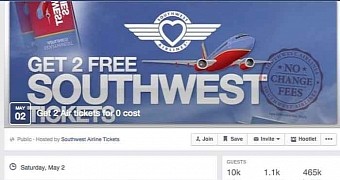Cybercriminals are currently advertising free Southwest Airlines tickets on multiple Facebook Event pages in an attempt to harvest email addresses from unsuspecting users.
The pages claim to be associated with the airline company and tout that anyone could win a free ticket by joining the event and sharing it on the social network with as many people as possible.
Bogus offer claims that 25,000 free tickets are available
To be eligible for two tickets, 200 friends need to be notified about the fake event, and inviting all the friends on the list allegedly offers the possibility of winning four tickets.
The purported reason for the event is the celebration of the company’s 10-year anniversary of providing the “most amazing service worldwide,” and to mark the event 25,000 airline tickets are given away.
A comment showing appreciation of the raffle is also required, most likely in a bid to increase the visibility of the page.
Potential victims are instructed to follow a link that leads outside the Facebook ecosystem, where online surveys are hosted, requiring personal information before starting to complete them.
To incite the user to provide the data, the third-party websites also advertise the possibility of winning different prizes, if name and email address are provided and the survey is completed.
Squinting for the fine print
The scam is designed not only to earn the fraudsters a monetary reward as a result of providing the input for allegedly statistical purposes but also to collect contact details, which can be used in different deceiving operations at a later time.
“Moreover, fine print on the survey sites will state that user details will be shared with third-party marketers. Thus, victims may soon begin receiving unwanted and annoying marketing emails, letters and phone calls,” Hoax Slayer reports.
Facebook Events are a new means for crooks to do their deceiving tricks, but just like in the case of a regular page or post on the social network, users are advised to be cautious when “too good to be true” offers are encountered.
A simple web search for more details should return no results from reputable sources about amazing offers, if they are fake. On the same note, users are advised to look for more information on the company’s website, as such events are definitely not organized without proper official advertising.

 14 DAY TRIAL //
14 DAY TRIAL //